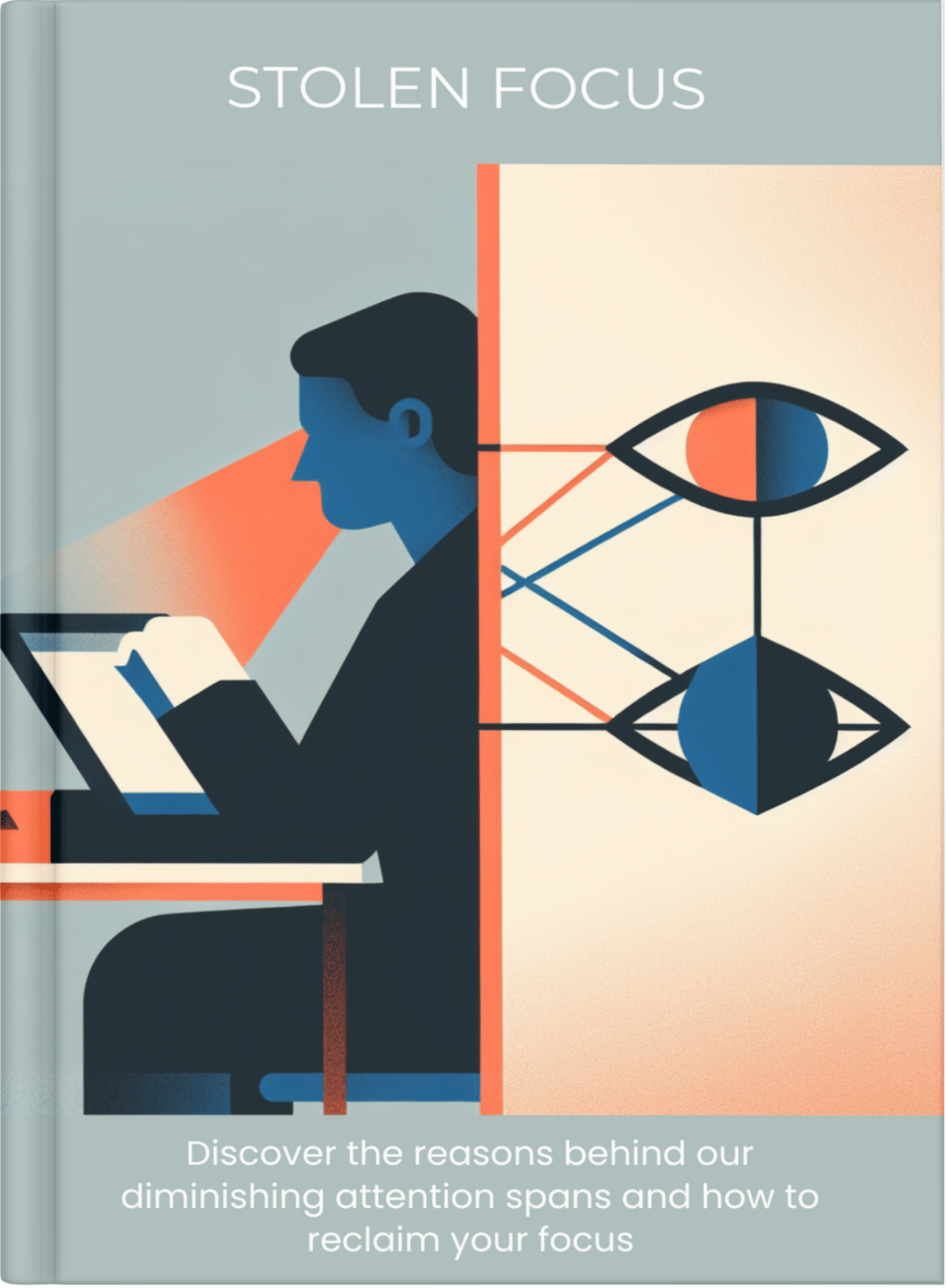
Stolen Focus: Why You Can't Pay Attention
Johann Hari
In 'Stolen Focus: Why You Can't Pay Attention,' Johann Hari explores the reasons behind the modern-day crisis of attention. He delves into various factors that contribute to our diminishing ability to focus, including technology, social media, and societal changes. Hari also offers insights and potential solutions to reclaim our attention and improve our mental well-being.
0:000:00
Keypoint 1: The Attention Crisis
The modern world is facing an unprecedented crisis of attention. In today's fast-paced society, the ability to focus has become a rare commodity. The constant barrage of information, notifications, and distractions has led to a significant decline in our capacity to concentrate. This phenomenon is not just an individual problem but a societal one, affecting people of all ages and backgrounds.
One of the primary reasons for this attention crisis is the overwhelming presence of technology in our lives. Smartphones, tablets, and computers have become indispensable tools, but they also serve as constant sources of distraction. The average person checks their phone dozens of times a day, often without even realizing it. This habitual behavior fragments our attention and makes it difficult to engage in deep, meaningful tasks.
Social media platforms are particularly culpable in this regard. Designed to capture and hold our attention, these platforms employ sophisticated algorithms to keep us scrolling and clicking. The endless stream of updates, likes, and comments creates a feedback loop that is hard to break. As a result, our attention spans are shrinking, and our ability to focus on a single task for an extended period is diminishing.
The environment we live in also plays a crucial role in the attention crisis. Urbanization, noise pollution, and the constant hustle and bustle of city life contribute to a state of perpetual distraction. Even in quieter settings, the omnipresence of digital devices ensures that we are never truly free from interruptions.
The workplace is another area where the attention crisis is acutely felt. Open-plan offices, frequent meetings, and the expectation of constant availability make it challenging to concentrate on work. Multitasking, once seen as a valuable skill, is now understood to be detrimental to productivity and mental well-being. The constant switching between tasks prevents us from achieving a state of flow, where we can perform at our best.
The educational system is not immune to the attention crisis either. Students are increasingly finding it difficult to focus on their studies, with many schools integrating technology into the classroom in ways that may exacerbate the problem. The pressure to perform and the prevalence of standardized testing further contribute to the stress and distraction that students experience.
The attention crisis has far-reaching implications for mental health. Chronic distraction and the inability to focus can lead to increased stress, anxiety, and even depression. The constant need to be 'on' and the fear of missing out (FOMO) create a sense of unease and dissatisfaction with life.
Addressing the attention crisis requires a multifaceted approach. On an individual level, it involves setting boundaries with technology, practicing mindfulness, and creating environments conducive to focus. On a societal level, it calls for policy changes that prioritize mental well-being and encourage healthier relationships with technology. Only by acknowledging and addressing the root causes of the attention crisis can we hope to reclaim our ability to focus and lead more fulfilling lives.
One of the primary reasons for this attention crisis is the overwhelming presence of technology in our lives. Smartphones, tablets, and computers have become indispensable tools, but they also serve as constant sources of distraction. The average person checks their phone dozens of times a day, often without even realizing it. This habitual behavior fragments our attention and makes it difficult to engage in deep, meaningful tasks.
Social media platforms are particularly culpable in this regard. Designed to capture and hold our attention, these platforms employ sophisticated algorithms to keep us scrolling and clicking. The endless stream of updates, likes, and comments creates a feedback loop that is hard to break. As a result, our attention spans are shrinking, and our ability to focus on a single task for an extended period is diminishing.
The environment we live in also plays a crucial role in the attention crisis. Urbanization, noise pollution, and the constant hustle and bustle of city life contribute to a state of perpetual distraction. Even in quieter settings, the omnipresence of digital devices ensures that we are never truly free from interruptions.
The workplace is another area where the attention crisis is acutely felt. Open-plan offices, frequent meetings, and the expectation of constant availability make it challenging to concentrate on work. Multitasking, once seen as a valuable skill, is now understood to be detrimental to productivity and mental well-being. The constant switching between tasks prevents us from achieving a state of flow, where we can perform at our best.
The educational system is not immune to the attention crisis either. Students are increasingly finding it difficult to focus on their studies, with many schools integrating technology into the classroom in ways that may exacerbate the problem. The pressure to perform and the prevalence of standardized testing further contribute to the stress and distraction that students experience.
The attention crisis has far-reaching implications for mental health. Chronic distraction and the inability to focus can lead to increased stress, anxiety, and even depression. The constant need to be 'on' and the fear of missing out (FOMO) create a sense of unease and dissatisfaction with life.
Addressing the attention crisis requires a multifaceted approach. On an individual level, it involves setting boundaries with technology, practicing mindfulness, and creating environments conducive to focus. On a societal level, it calls for policy changes that prioritize mental well-being and encourage healthier relationships with technology. Only by acknowledging and addressing the root causes of the attention crisis can we hope to reclaim our ability to focus and lead more fulfilling lives.

